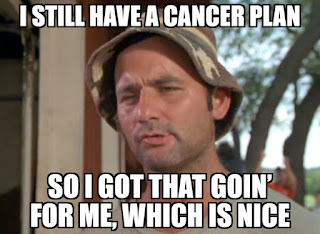From time to time I like to talk with someone I know and admire, hoping that they will instill some wisdom that can help me succeed. So last week I talked with my good friend and colleague, Jeanne Doran aka The Insurance Goddess. We discussed how she and I met and I asked for her permission to use some of her sage advice in the blog. As a gracious lady, she said yes.
I met Jeanne about 10 years ago when I was selling health insurance (pre-Obamacare). She was working for the Gilston Agency in Charleston, SC and I was contracted through them to sell a major medical coverage. I'm not sure if she was a CSR but she helped me over the phone and email with some issues occasionally. Always helpful and a bit sarcastic (like me!), I kept in contact with her, even after she had moved on from Gilston and had become an independent agent. I had a life insurance carrier that I liked to use and got Jeanne contracted with them.
More importantly though, I would call Jeanne when I had questions about health insurance. She was, and still is, a great resource when an answer is needed quickly. Over the years we have remained friends and I was enthused when she finally accepted my offer to work with Surf Financial Brokers. She even let me put her picture on the website!
Without further ado, here is a snippet of our conversation.Me: I know you told me this before, but it wasn't your idea to go into the insurance business, was it?
Jeanne: Honesty, my husband recommended I work in the insurance business. He thinks I'm good with people.
Me: Well, you are. How do you find your prospective clients?
Jeanne: My business primarily referral based. Once I have assisted a client with their insurance needs we look at other options to round them out.
Me: That makes sense. How do you prepare for a client meeting?
Jeanne: Typically I cross evaluate types of plans within the product line they are looking for. For instance, if it's a health case I look at BCBSSC (Blue Cross), United, and Aetna, then look at the costs versus the benefits and share those details at the "meeting". And I always keep in mind there may be something more for them to round them out.
Me: Do you attend any kinds of networking groups?
Jeanne: I only am in one networking group at this time and it's industry based.
Me: Not counting my book, do you recommend any good books on sales?
Chris Castanes is the president of Surf Financial Brokers, helping people find affordable life and disability insurance coverage. He's also is a professional speaker helping sales people be more productive and efficient and has spoken to professional and civic organizations throughout the Southeast. And please subscribe to this blog!









